In its essence, a business is much like a machine made up of several parts. Each of these parts has to work together smoothly to ensure the proper execution of business operations.
Operational CRM is the key to keeping your business running like a well-oiled machine with no hiccups.
Misalignment between different business units can take various forms. Information from the sales team can get lost before it ever makes it to the support team. Or your employees may feel frustrated with the absence of a central platform where they can share information with other departments. This proves to be a hindrance in your entire organization working together toward meeting business goals.
Operational CRM can help overcome this by aligning your sales, marketing, and support teams. It can work as the lifeblood of your organization by streamlining processes and helping you communicate with prospects and customers effectively. Discover everything you need to know about operational CRM tools and their utility for your business with this in-depth guide. Also, find the best practices for making the most of your CRM deployment.
It’s time to hit the ground running with robust customer relationship management!
What is Operational CRM?
Operational CRM brings sales, marketing, and customer support processes together, contributing to enhanced customer relationships. Such a tool centralizes your data and streamlines business operations, leading to improved productivity and better customer interactions.
CRM encompasses all the processes that help strengthen relationships with customers. These include automated processes, more personalized interactions, optimized offerings, and continuous engagement.
With CRM tools gaining such massive popularity, it is important for a business to realize the true potential of CRM and implement it to best suit their needs.
Operational CRM is a comprehensive solution that serves a wide range of business functions, including:
- Streamlining business processes
- Enabling internal communication
- Centralize customer data
- Manage client interactions
- Automate tasks
- Monitoring the effectiveness of operations
Read More: Benefits of CRM: Why CRM is Important for Your Business
What Does an Operational CRM Do?
Operational CRM is one of the three types of CRM. The other two are- analytical and collaborative CRM.
This distinction between CRM tools is based on their overall functionality. While the other two types of CRM are more concerned with just one business function, operational CRM tools are far more broad-scoped. These comprehensive customer relationship management systems work as a centralized platform for managing multiple business facets.
Operational CRM tools function as a shared interface for your entire organization to work together seamlessly. This leads to easy sharing of business information, collaboration across departments, and enhanced customer experiences.
With an operational CRM tool, you can create more cohesive customer journeys that offer consistent engagement across all touchpoints. Such tools help automate engagement, manage leads, schedule meetings, and track upcoming tasks. They also ensure that there are no delays in your operations, which leads to delightful customer experiences.
Here’s an in-depth explanation of how operational CRM tools work for different departments of your business:
Marketing:
Marketing teams require a consolidated database of leads and customers to deliver personalized engagement. They also need a solution to manage their lead lists and track marketing campaigns. Operational CRM caters to all these needs. It provides easy access to necessary customer details, which can be utilized to deliver personalized and meaningful engagement.
Sales:
There are a number of sales processes that an operational CRM can support, including lead capturing, qualification, routing, nurturing, and pipeline management. Sales representatives need a powerful tool that keeps data organized to close more deals. Operational CRM facilitates the entire sales workflow, as well as automates tasks such as meeting scheduling, email follow-ups, etc.
Service:
Operational CRM tools have a significant role to play in managing customer service interactions. These tools help manage customer support requests, deliver automated responses to frequently asked questions, and enable businesses to deliver prompt help, which leads to customer loyalty and satisfaction. Process tickets quickly and deliver more relevant support to your clients with the built-in helpdesk functionality of an operational CRM.
Benefits of Operational CRM
Operational CRM benefits all the stakeholders- whether it is your team or customers.
Fundamentally, the role of a CRM is to enhance access to relevant business information and consequently improve the quality of interactions between an organization and its customers. Take the dashboard of BIGContacts CRM, for example.
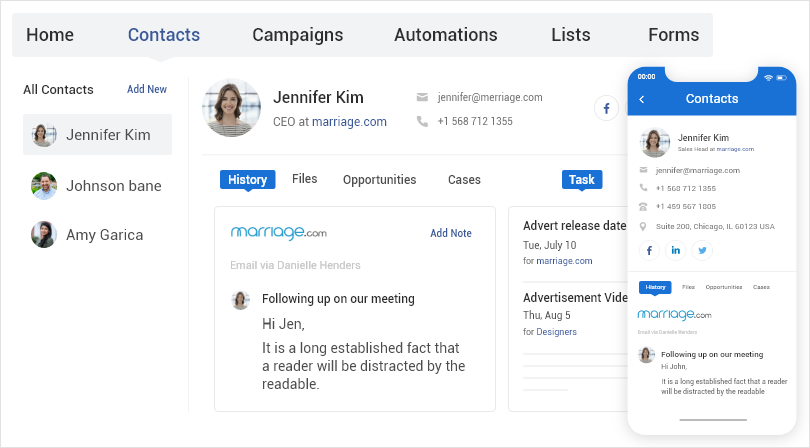
Employees across your organization can log on to this centralized platform and view updated customer information in a jiffy. This allows them to find important contact details, track previous interactions, and view upcoming meetings from the same place. Moreover, employees can use this system to maintain their personal to-do lists, track their progress using advanced reports, and share information with other team members.
This is an example of the wide array of CRM operations that can help your profitability.
Bring All Business Data Together:
Integration of customer data with business processes yields more positive outcomes. It allows you to understand buyer personas, optimize your offerings based on customer needs, and delight customers to retain them for a long time.
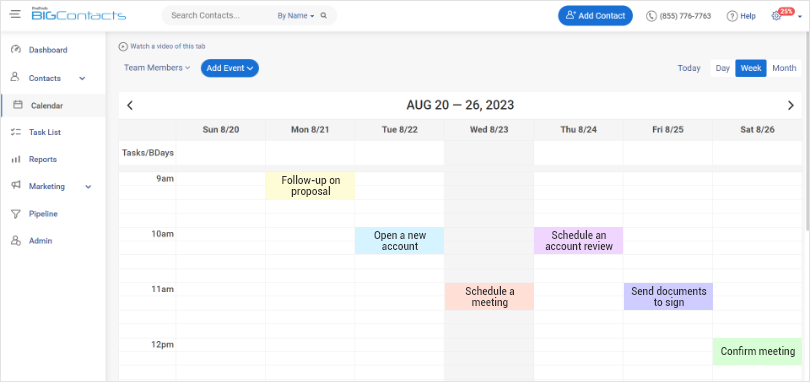
Keep Your Team on the Same Page:
A well-noted advantage of CRM is improved collaboration. An operational CRM does not just enable communication between different business divisions (i.e., your sales, marketing, and support teams) but also keeps everyone updated with customer information from a single platform.
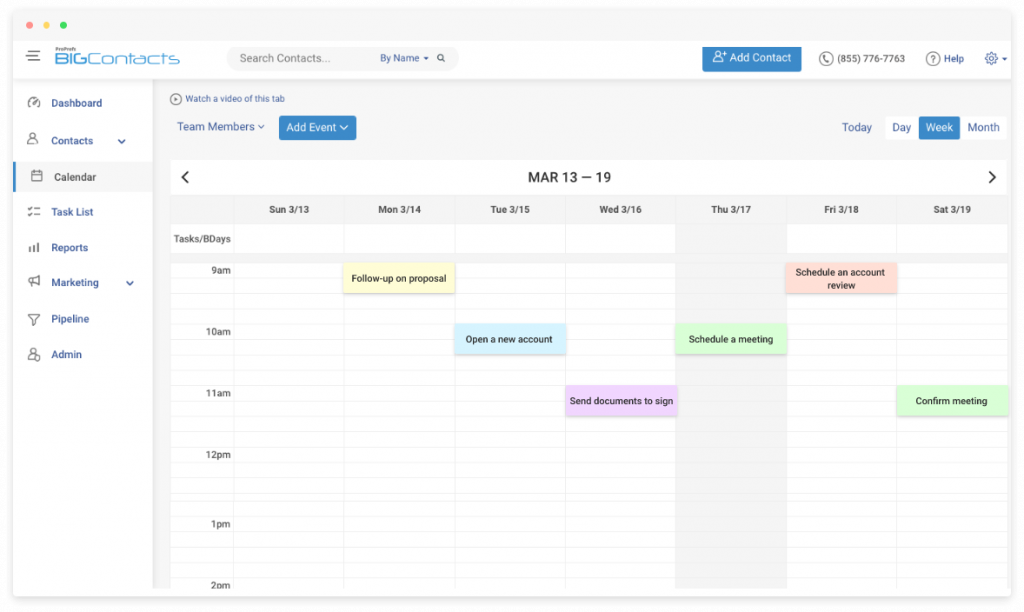
Automate Processes & Workflows:
An operational CRM system can improve your day-to-day efficiency by automating repetitive tasks. It can also help you create custom workflows with triggers and automated actions so you can get things done without much hassle. You can also create automated drip emails and manage them using an operational CRM tool.
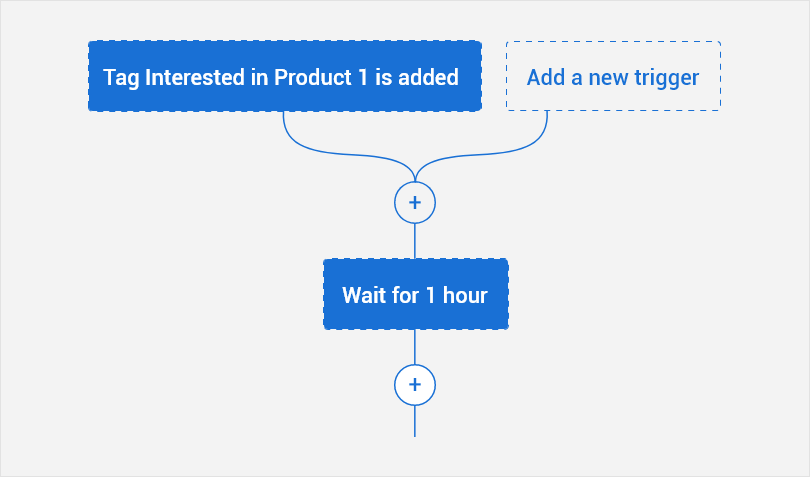
Improve Customer Satisfaction:
Enhanced internal processes lead to improved experiences for customers. Operational CRM brings all related data and processes together so you can improve upon your quality of customer service. Moreover, you can engage with customers without any delays, which leads to an improvement in your retention rate.
Operational CRM Best Practices
Simply deploying an operational CRM is not enough to warrant profits for your business. You must utilize the tool effectively in order to see real growth in your revenue and customer retention.
Here are some best practices to put your operational CRM to good use.
Identify Challenges & Pain Points:
The first step to implementing a CRM tool is finding areas where your team members need help.
Does your team struggle with information in silos?
Are there some repetitive tasks that consume a major share of your team’s time?
What challenges does your team face during customer interactions?
Answering such questions will help you analyze your needs and create an effective CRM strategy accordingly.
Have a CRM Implementation Plan:
One of the best practices for CRM is having an effective implementation strategy in place. This will enable you to derive the maximum benefit from your CRM tool. The implementation also involves proper data cleaning, migration, and employee onboarding. Define key metrics as performance indicators at the beginning to track a successful deployment of your CRM system.
Perform Routine Checks:
Once you have a CRM for startups in place, you must carry out regular audits to ensure that it is producing the results that you expected. Define clear business metrics and track them continuously. Also, take into account feedback from your team to identify areas where your CRM strategy can be improved.
After all-
“Continuous improvement is better than delayed perfection.”- Mark Twain.
Integrate With Your Tech Stack:
In order to improve the effectiveness of your operational CRM system, integrate it with the suite of business software that you currently use. Choose a tool such as BIGContacts that offers a broad range of integration options with tools such as team communication tools, business analytics software, email marketing tools, etc. This will keep your data seamlessly synchronized and accessible across multiple platforms.
How to Choose an Operational CRM
Having listed the advantages and best practices of operational CRM, we come to a pertinent question-
How to find a tool that works for your organization?
Selecting a CRM tool is not a straightforward task. It is a high-stake business decision that requires considerable thought and time. Several factors come into play for businesses making this decision.
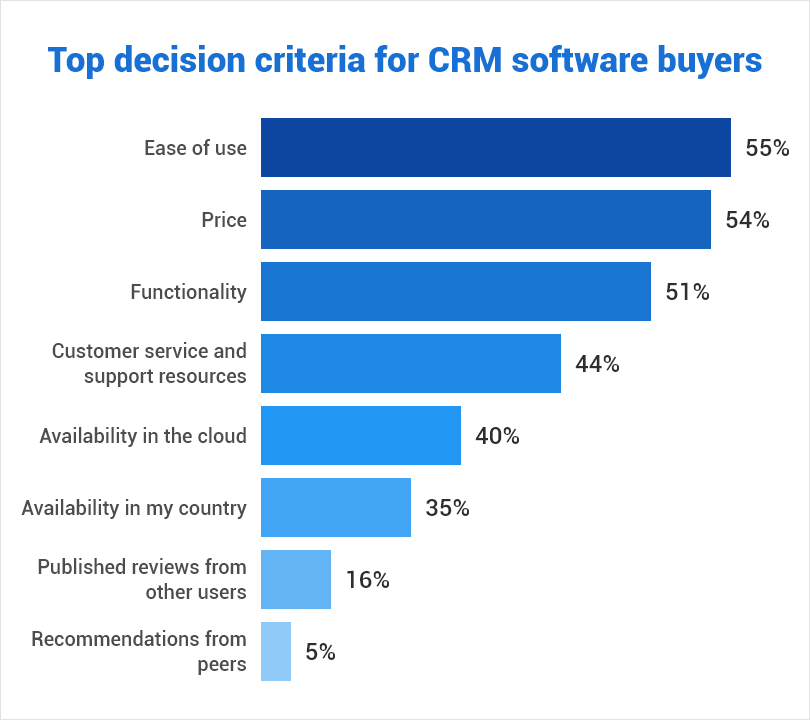
In order to find an operational CRM system that enhances your business profitability, you must:
Step 1: Know Your Requirements
What are you looking to accomplish with the CRM tool? Being aware of the definitive purpose is the first and foremost step toward finding the most effective CRM solution. Once you are aware of your needs, make a thorough comparison of the top-rated options available.
Step 2: Focus on Ease of Use
While it is tempting to opt for a tool that does it all, you’re better off with an uncomplicated solution that caters to your specific needs. Ease of use is an important factor that should be taken into account when selecting a CRM tool.
Step 3: Customizable All the Way
The CRM should offer extensive customization in order for it to be useful for your organization. It should adapt according to your needs. Go for a tool that lets you customize the fields, layouts, workflows, views, and permissions.
Step 4: Trial & Tech Support
Lastly, always make sure to go for a tool that offers a free trial period. This will help you better understand the tool’s utility and effectiveness. Also, take into account the quality of customer support provided by the vendor to find a reliable solution.
These steps will enable you to find the most effective operational CRM that keeps your profits high.
Make Business Processes a Smooth Sailing With Operational CRM
Different departments of an organization need centralized access to updated customer information in order to build long-lasting relationships.
Organizational CRM serves this purpose by keeping sales, marketing, and support operations aligned. It keeps data organized and improves the efficiency of internal processes to accelerate business growth. Along with aiding cross-departmental data sharing and collaboration, operational CRM also automates key processes, helping deliver quick solutions to customers.
You can leverage a robust operational CRM such as BIGContacts that does all of this and more to maximize your business’s earning potential. An intuitive application like this can enable you to improve the overall customer experience, thereby helping your retention rates.
The most effective operational CRM for your business will bring your entire organization together, helping you make strides toward hitting your projected numbers.
Frequently Asked Question
What are the components of operational CRM?
The main components of operational CRM are-
- Sales automation
- Marketing campaign management
- Customer support processes
What are operational and analytical CRM?
Operational and analytical CRM are two categories of CRM solutions. While operational CRM systems are more comprehensive tools that manage the day-to-day working of an organization, analytical CRM tools are more focused on gathering insights from business data to improve customer relationships.
What are the benefits of operational CRM?
Operational CRM tools offer a host of advantages to a business. The most significant of these are:
- Stores all important business data in one place
- Improves the effectiveness of routine operations
- Automates redundant activities to improve business productivity
- Monitor and analyze the performance of team members
- Enhances marketing campaigns
- Improve customer service & satisfaction
What does operational CRM typically support?
Generally, operational CRM tools are deployed to enhance and streamline sales, marketing, and service processes. They keep information organized across different business divisions, helping get things done at the right time and enhancing the overall productivity of an organization.
These tools automate repetitive tasks and ensure that there is a smooth flow of data within the organization. Operational CRM systems can be leveraged to improve cross-team collaboration, automate tasks, and analyze performance. These tools enable different business departments to come together and create more effective customer journeys.
FREE. All Features. FOREVER!
Try our Forever FREE account with all premium features!






